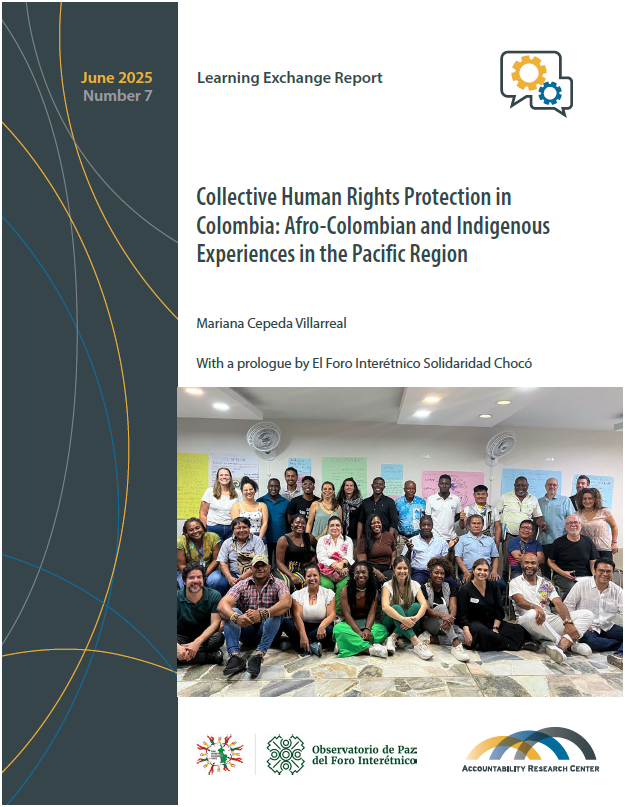
Collective Human Rights Protection in Colombia: Afro-Colombian and Indigenous Experiences in the Pacific Region
Date: June 2025
Author(s): Mariana Cepeda Villareal
Publication type: ARC Learning Exchange Report
Published by: Accountability Research Center
In Colombia, social leaders face persistent threats of violence, especially those who represent collective ethnic territories, many of which possess vast natural resources. Threats come in large part from armed actors and from individuals or companies with economic interests (legal and illegal) seeking to occupy the territories.
The Colombian State has legal obligations and public policy commitments to provide collective human rights protection measures, but its actions to implement them are still scarce and insufficient. According to the testimonies of social leaders of ethno-territorial organizations from the Pacific region who participated in the two learning exchanges that are the subject of this report, the government’s protection measures often do not meet the needs of the communities, nor do they fit the context or characteristics of the territories where communities live.
Many ethno-territorial organizations in Colombia have requested collective protection measures from the government via diverse institutional processes that all face similar bureaucratic challenges. They have not seen a coordinated response from the government. The government’s approach to providing protection measures involves challenges
for the organizations at risk, including a focus on individualized2 rather than collective initiatives that can protect entire organizations, an emphasis on police/military-style approaches rather than comprehensive protection measures, as well as confusion due to the government’s many different and complex bureaucratic processes (“routes”)
for organizations seeking protection measures. Participants in the learning exchange reported delays and inefficiency in the government’s provision of services, as well as a lack of political will to deliver on its commitments.
So far, these ethno-territorial organizations tend to seek governmental protection measures by each following their own routes, without coordinated and sustained joint initiatives to mutually reinforce each other in the face of the same institutional bottlenecks. Among local and national government agencies, there is a widely-held assumption that official protection measures are the exclusive responsibility of just one agency, the National Protection Unit (UNP). In contrast, ethno-territorial organizations call for comprehensive collective protection measures, which would require the intervention of multiple government agencies. The advocacy experience of the Community Council of San Juan (ACADESAN) shows that many other government agencies can indeed commit to providing multiple collective protection measures. However, more than a year after numerous agencies signed commitments, most of their actions have fallen short. This underscores the relevance of ongoing monitoring and advocacy to encourage them to deliver results.
Mariana Cepeda Villarreal is a political scientist from the Universidad de los Andes in Colombia and holds a Master’s degree in International Development from the School of International Service (SIS) at American University. Since 2017 she has worked as a researcher for the Accountability Research Center. She has worked in non-governmental organizations and for the Government of Colombia in the formulation and monitoring of public policies on transparency and anti-corruption. She is interested in issues related to transparency and citizen oversight, public sector management, peace building, and ethnic rights.
